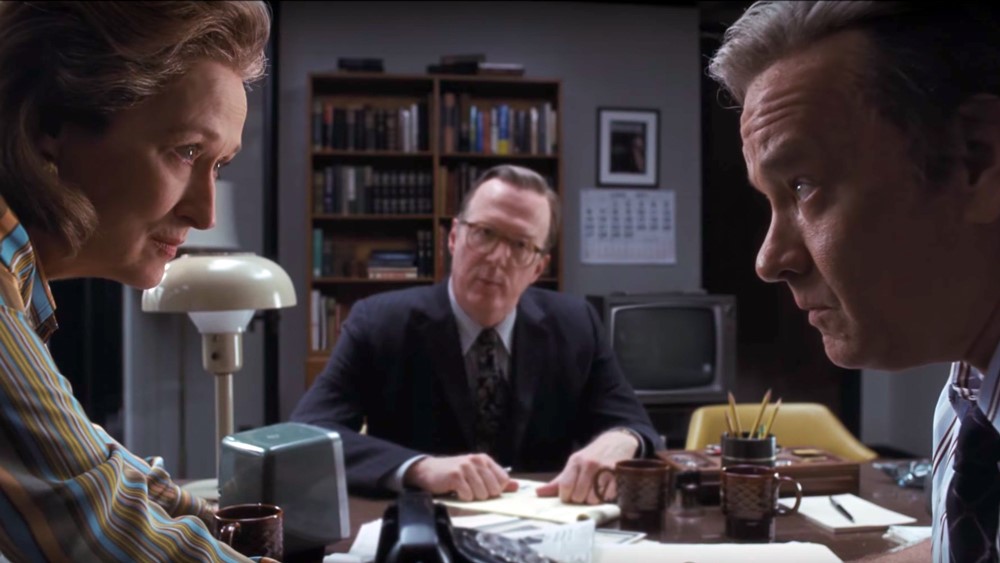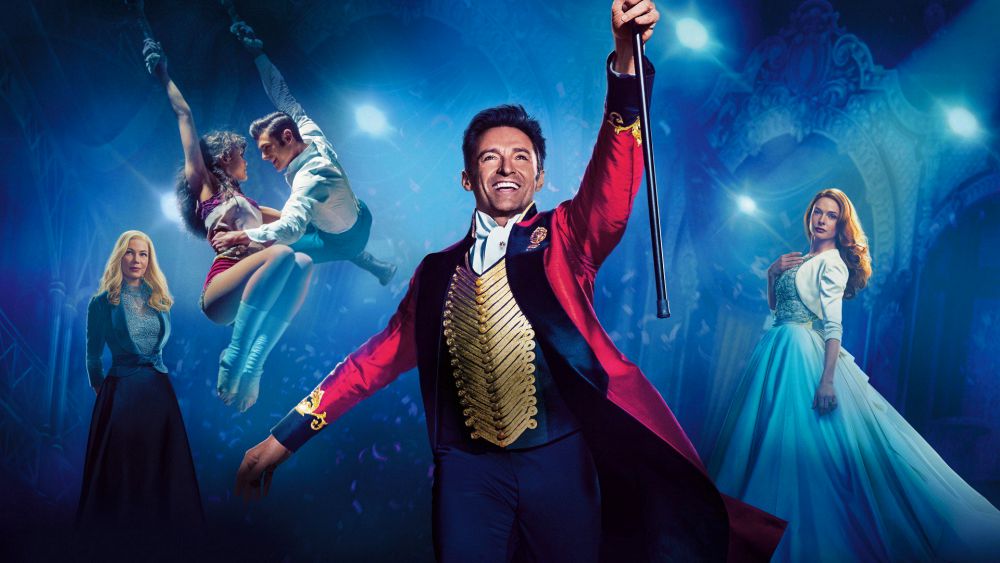
by Michael Foust | Jan 19, 2018
The Post gives us a story of a financially struggling newspaper taking on the U.S. government in a classic First Amendment-vs.-national security showdown – and it gets a few things wrong.
Katharine Graham is a 1970s female newspaper publisher, working in a man’s world. Her board at The Washington Post is all male. Her newsroom is nearly all male. And when she chats on the phone with a politician or big wig, it is almost always – you guessed it – with a man.
Few people believe she’s qualified, but perhaps that’s to be expected. She was handed the position only after her father and then her husband, Phil – both publishers of the newspaper – passed away. With the newspaper being family-owned, she was next in line.
“The only reason she’s running the paper is because Phil died,” a board member says.
But despite her inexperience, she has a big decision to make. The Post’s reporters have dug up a secret copy of the so-called Pentagon Papers – a lengthy government-commissioned study that showed (among other things) the U.S. intensified its involvement in the Vietnam War despite major doubts it would succeed.
Even before The Washington Post uncovered the documents, a federal judge had issued an injunction stopping The New York Times from reporting on the Pentagon Papers for fear it would harm national defense interests.
Will Graham allow Post editor Ben Bradlee to publish his reporters’ stories about the Pentagon Papers in defiance of a judge’s order – an action that could land her and Bradlee in jail?
It’s all part of the new movie The Post (PG-13), which is in theaters and stars Meryl Streep as Kay Graham and Tom Hanks as Ben Bradlee. It was directed by Steven Spielberg and recounts the story of The Washington Post’s decision to publish stories about the Pentagon Papers – stories that sparked a Supreme Court hearing and victory over the Nixon White House.
Viewed without a political lens, the movie can be riveting: A financially-struggling newspaper takes on the U.S. government in a classic First Amendment-vs.-national security showdown – with newspaper deadlines and Nixon-style tactics as a backdrop.
Of course, this film cannot be viewed without a political lens, and Spielberg and The Post take a firm stance. Their position is clear: The Vietnam War was a mistake; the government lied about it; Nixon was a bad guy; the Pentagon Paper leakers were heroes; and Graham and Bradlee were champions of the First Amendment. If those aren’t your positions, then you may want to skip this movie (Truman, Eisenhower, Kennedy and Johnson also are blamed for everything, but only in passing).
Still, The Post raises several questions about freedom and the press that are worth a 21st-century discussion – in the classroom and around the dinner table.
Violence/Disturbing
Minimal/moderate. The film’s only violence takes place in the opening minutes, when we watch U.S. soldiers fighting in the jungles of Vietnam. We see soldiers carrying rifles, and several of them are shot. Moments later, some are carried off on stretchers.
Sexuality/Sensuality/Nudity
None.
Coarse Language
Excessive, with 50 coarse words: s—t (13), GD (6), a—(6), JC (5), misuse of “God” (4), h-ll (3), d—n (3), SOB (2), misuse of “Jesus” (2), misuse of “Christ” (2), OMG (1), f-word (1), pi-s (1), b—tard (1).
Other Positive Elements
The Post’s stances on freedom of the press are commendable. Bradlee says during one poignant moment: “We have to be the check on their power. If we don’t hold them accountable, who will?” The media is an easy target in today’s culture, but imagine a modern society without local newspapers on any level – even small towns — and then apply Bradlee’s words. Who will cover (boring) town council meetings? Who will uncover corruption? Who will hold the mayor accountable? Sure, we can rely on citizen journalists, but not every community has someone with such commitment and skills. The more people who are covering it, the better.
Other Stuff You Might Want To Know
We see a character steal the Pentagon Papers. Someone says about its conclusion: “They knew we couldn’t win and still sent boys to die.” Lots of people in the film smoke.
Worldview
Some scholars argue that our American model of checks and balances was based on a firm belief in human depravity – that it was unwise to give one person or one branch too much power. Otherwise, they would abuse it. Thus, the Founders designed three branches of government within the U.S. Constitution. Those same Founders and that same Constitution also guaranteed the freedom of the press. Conflicts were unavoidable.
The Post raises a host of questions.
What are the limits of a free press? Could it legally have published battle plans ahead of D-Day? (As one judge asks.) Does it have the right to publish military secrets that might endanger soldiers’ lives? Can it legally publish transcripts of conversations between world leaders – an action that could weaken national security and relations between nations?
The questions about the government’s power are just as tricky. When, if ever, can the government step in and tell the press it cannot publish military or government secrets? And if it gets away with that, won’t it try to push the envelope even further the next time – as the government always does? Who decides what should and should not be published? Isn’t this our government, after all?
There are no easy answers, but it’s a lot simpler if both sides are responsible.
I’ve been in journalism more than 25 years – as an editor and writer. I’ve held stories back because I didn’t think it was responsible to publish them. And I’ve seen stories held that I thought should be published. To the credit of The Post, Graham and Bradlee have similar discussions about the need of responsibility.
What I Liked
Watching old-school journalism at work: the typewriters, the 70s-era newsrooms, the typesetting, the presses. And watching reporters digging days and weeks for the story.
What I Didn’t Like
The excessive language. And the movie’s comical portrayal of Nixon. Spielberg might as well have cued Darth Vader’s theme (The Imperial March).
Thumbs Up … Or Down?
Thumbs up for its entertainment value. Thumbs down for its placing all the blame on Nixon.
Discussion Questions
- Should The Post have published the Pentagon Papers?
- Should there be limits on what the press can publish? If so, who decides?
- Should the government be able to stop the media from publishing certain stories? If so, what should the punishment be?
- What did you think of the movie’s portrayal of Graham, Bradlee and Nixon?
Entertainment rating: 2.5 out of 5 stars. Family-friendly rating: 2 out of 5 stars.
The Post is rated PG-13 for language and brief war violence.

by Michael Foust | Jan 18, 2018
Forever My Girl is an entertaining movie that gives us something rarely seen on the big screen: a mostly squeaky-clean romance with no bedroom scenes, no rough language and no distracting bad acting.
Liam Page is a world-famous country singer who has everything the world can offer: big houses, beautiful women and fans who idolize his every move.
Yet despite his wealth, he often thinks about Josie, the fiancé he abandoned on their wedding day eight years earlier in their hometown of St. Augustine, La, when he was young and immature.
It seems they’ll never meet again – until providence intervenes.
A childhood friend dies, sending him back to that small Louisiana town for a funeral that is sure to put him and his ex in the same room.
Josie, though, isn’t amused by his presence, and neither are the townspeople, who view him as a spoiled superstar who turned his back on them. In fact, they despise him. Even his father – a pastor – is mad at him.
But time has a way of healing wounds, and when he learns that Josie is the single mom of a 7-year-old girl – his daughter – he decides he wants back in Josie’s life. What will she do?
The PG-rated Forever My Girl opens in theaters this weekend, starring Alex Roe (The 5th Wave) as Liam, Jessica Rothe (La La Land) as Josie, and Abby Ryder Fortson (Ant-Man) as their daughter. It’s based on a novel by Heidi McLaughlin.
Forever My Girl is a charming and entertaining movie that gives us something rarely seen on the big screen: a mostly squeaky-clean romance with no bedroom scenes, no rough language and no distracting bad acting. It’s the type of film that I’d likely take my daughter to watch – if she were a teenager. It’s also the kind of family-friendly romance we need in the age of one-night hookups and Fifty Shades.
Warning: moderate spoilers ahead!
Violence/Disturbing
Minimal. Upon seeing Liam, Josie punches him.
Sexuality/Sensuality/Nudity/Romance
Minimal. Early in the movie we see Liam in bed, shirtless. A woman is out of bed and dressed, and although nothing is discussed, it is implied they slept together. Later, we see him alone in bed with only shorts on. Josie wears a somewhat low-cut dress with no back. They kiss twice. We also see them slow dance.
Coarse Language
Minimal. OMG (3), crap (1), sexy (1).
Other Positive Elements
Because Liam’s father is a pastor, we hear samples of sermons during several church scenes (including the funeral). We hear the pastor speak about the “grace of God” and forgiveness. We also hear about someone possessing “God-given talent.”
Other Stuff You Might Want To Know
Josie drinks beer in a casual setting but doesn’t get drunk. Liam goes to a bar and apparently does get drunk (He drinks several times in the film).
Josie had learned she was pregnant with Liam’s daughter two weeks before the wedding. She chose to keep the baby, although Liam never knew about the girl.
Life Lessons
The movie gives us lessons on taking responsibility for your actions (Liam), repenting (Liam), forgiveness (Josie, others), and riches not bringing happiness (Liam). There’s also an implicit pro-life message, although we never hear any discussion of whether Josie considered anything other than keeping the baby.
Worldview
I’m a sucker for movies about redemption. Perhaps that’s because the Bible is full of stories about men who committed awful acts – Moses, David and Paul, just to name three – but who found forgiveness. Forever My Girl gives us that element, even if it isn’t strictly faith-based.
But there’s another reason I like Forever My Girl. That’s because it’s a film about taking responsibility. Sociologists tells us that many, if not most, of society’s ills can be attached to the “unattached male” who doesn’t take responsibility. In this movie, we see just the opposite.
Thumbs Up … Or Down?
Thumbs up.
Discussion Questions
- Would you have forgiven Liam?
- How does age and maturity impact our decision-making?
- What do you think led Liam to abandon Josie?
- Why do you think it took so long for Liam to return?
- What can we learn about fame, riches and happiness from the movie?
Entertainment rating: 3 out of 5 stars. Family-friendly rating: 4 out of 5 stars.
Forever My Girl is rated PG for thematic elements including drinking, and for language.

by Michael Foust | Jan 12, 2018
Paddington is a lovable Peruvian bear with a small ego and big heart. But he’s also short on money, and with his Aunt Lucy’s 100th birthday just around the corner, he needs some cash for a gift – and fast.
So, Paddington does what any intelligent, talking bear in his situation would do: He works a few odds jobs with the goal of buying a one-of-a-kind, London-themed popup book from the local antique shop. It seems that Aunt Lucy – who lives far, far away — had always wanted to visit the historic city.
“If she saw this, it would be like she were finally here,” he says.
Paddington cleans windows. He washes pets. He even cuts hair at a salon.
But then the unthinkable happens. With his financial goal within reach, someone steals the popup book in the dead of night. Even worse: Police believe Paddington did it, and he is sentenced to 10 years in prison for grand theft.
Will the real thief ever be caught? And can Paddington’s contagious charm melt the hearts of London’s worst criminals, as it did his British family, the Browns?
It’s all part of Paddington 2 (PG), which opens this weekend and shows Paddington facing real-world challenges he didn’t see in the first film (2015). It stars Ben Whishaw as the voice of Paddington; Hugh Bonneville (Downton Abbey) as Henry Brown; Sally Hawkins (Blue Jasmine) as Mary Brown; and Hugh Grant (Four Weddings and a Funeral) as Phoenix Buchanan, a man who has little regard for Paddington.
The character is based on a series of children’s book by author Michael Bond, who died last year at the age of 91.
Like its predecessor, Paddington 2 is a fun film that delivers innocent humor and positive characters rarely seen on the big screen. I laughed – a lot. It’s close to being the perfect family-friendly movie.
Warning: mild spoilers!
Violence/Disturbing
Minimal. We learn of a trapeze artist who dies, and we see her bloodless body lying on the ground in a circus-like setting. A character threatens another character with a sword. A character nearly dies underwater due to drowning.
Sexuality/Sensuality/Nudity
Minimal. We hear a comment, twice, about “nice buns.” It initially is referencing sweet treats, but it is taken as a reference to the human body.
Coarse Language
Minimal. OMG (1).
Other Positive Elements
We learn of Paddington’s origins; he was adopted as a cub by a bear couple who made great sacrifices to raise him. “If we look after this bear, I have a feeling he’ll go far,” the female bear says.
We see inmates change for the better because of Paddington’s kindness.
The Browns work diligently to catch the real thief and to have Paddington’s name cleared.
During a scene within St. Paul’s Cathedral, a security guard says in reference to a possible crime: “Only the good Lord knows.”
Other Stuff You Might Want To Know
Paddington cleans a window with soap and his bottom. We see a fortune teller at a local fair (but we don’t hear her predict the future). A security guard in St. Paul’s Cathedral describes a nun as the “most beautiful woman” he has seen (The woman actually was a man dressed as a nun.) We hear someone describe actors as evil people who “lie for a living.” Mr. Brown briefly practices an exercise that looks like yoga.
Life Lessons
Paddington delivers several significant life lessons for children and adults, including being kind to everyone you meet, having a positive outlook on life, and looking for the good in others. The movie also gives us an example of characters who change from bad to good.
Worldview
We live in a cynical society, where sarcasm dominates, selfishness reigns, and everyone is striving to get the last word.
Perhaps that’s why Paddington (2015) and Paddington 2 are so refreshing. The hero is a lovable little bear who was taught at an early age, “If we’re kind and polite, the world will be right.” Sure, he’s clumsy and crazy, but he’s also considerate and caring. Paddington 2 certainly is not a faith-based film, but it nevertheless gives us a character who exhibits more fruit of the spirit (Gal. 5:22-23) than do most other big-screen protagonists. He’s always looking “for the good in people,” and he’s a character we want our children to emulate.
Of course, we know that the heart of man is wicked (Jer. 17:9). We also know that only the Gospel – and not kindness – can save the world. But I’m guessing that if more Christians exhibited Paddington’s kindness – a quality that Scripture commands (Eph. 4:32) – there would be more people in the pews.
What I Liked
The comedy. It’s not easy finding films with appropriate humor for children, but Paddington 2 has plenty of it. Who wouldn’t enjoy watching our beloved bear give someone a bad haircut – and then try and fix it with marmalade? Also, moviegoers shouldn’t miss the humor in the most unlikely of places – like the random newspaper headlines.
What I Didn’t Like
The finale includes an underwater scene that seemed over the top and unnecessary. But I’m nitpicking.
Thumbs Up … Or Down?
Thumbs up.
Discussion Questions
- Why do people like Paddington, even though he’s clumsy?
- Can kindness change the world? How? How not?
- Should we look for the good in people? Is there a downside?
- List all of Paddington’s positive traits. Which ones do you need to practice more?
Entertainment rating: 5 out of 5 stars. Family-friendly rating: 4.5 out of 5 stars.

by Michael Foust | Jan 11, 2018
Filmmaker Paul King didn’t have to be persuaded to direct the 2015 film Paddington. He essentially campaigned for it.
A child of the ‘70s, King remembers lying on the living room rug as a child and watching the stop-action Paddington TV series, laughing at the lovable bear’s clumsy antics.
So, when he learned several years ago that a Paddington film was in the works, he launched what he now describes as a “one-person campaign” to become director.
“I just had a feeling of how it could work,” said King, whose sequel, Paddington 2, opens this weekend. “I started writing letters, and I managed to get a meeting with one person, and then their boss, and finally I got a meeting with (producer) David Heyman. … I tried to explain why this young director that he really didn’t know was the only person who should be making Paddington.”
At the time, King was a 30-something filmmaker with only a handful of lesser-known projects to his credit, but Heyman nevertheless gave him the role. It’s safe to say it turned out well. It was one of the Top 40 grossing movies of 2015 with $76 million and was widely praised, receiving a score of 98 percent fresh at RottenTomatoes.com, where 80 percent of moviegoers said they liked it.
The Paddington movies are based on a series of children’s book by Michael Bond, who passed away last year at age 91.
King served as a co-writer on both films.
In Paddington 2, our heroic bear is searching for the perfect present for Aunt Lucy’s 100th birthday when he sees a pop-up book in a store and embarks upon a series of odd jobs to buy it. But when the book is stolen, it’s up to Paddington and his family, the Browns, to find the thief.
Making a sequel can be “tricky,” King said.
“(Paddington) hadn’t done much in the wider world (in the first film), and so we really wanted to send him out into the community, and see how his goodness stands up against the big, cynical city,” King said. “And (we’d) see whether he could change the world with his kindness, or whether his kindness would be sort of crushed by this reality and cynicism.”
King calls himself a fan of Charlie Chaplin films, Pixar movies and the Wallace and Gromit clay animation series – all projects that feature innocent humor that can make the whole family laugh.
One of his goals was to make a film featuring a similar type of clean humor, he said.
“There’s a great tradition of these sort of quality movies where the jokes are for everyone,” King said, adding that he wanted Paddington 2 to be the type of film “that can bind the whole family together.”
Although Paddington the bear is funny, he also has positive traits that children can model.
“Paddington is brought up by his Aunty Lucy, and she has these kind of really phenomenal values, of looking for the good in other people,” King said. “He always has a very kind and polite attitude. One of the things he does that is very special is he doesn’t judge a book by its cover.”
Visit Paddington.com for more information.
Paddington 2 is rated PG for some action and mild rude humor.

by Michael Foust | Jan 5, 2018
Movie buffs who enjoy history and musicals will fall for The Greatest Showman. Our reviewer did. The music and choreography are just as catchy as that in the 2016 hit La La Land. The movie has a great message, too.
Phineas is a hard-working husband and father who has a flare for creativity and innovation. Right now, though, he’s unemployed and just needs a job to feed his two daughters in 1800s America.
Desperate, he risks everything and borrows $10,000 to open a downtown museum of “oddities.” It’ll have everything not seen in other museums – even wax figures and the world’s tallest giraffe (stuffed, of course).
Sadly, though, no one comes. His young daughters think they know the problem.
“You have too many dead things in your museum,” one says. The museum, they tell him, needs “something sensational.”
So Phineas hangs posters up throughout the city searching for “Unique Persons and Curiosities.” He soon finds them: a bearded woman with an incredible singing voice, a man with hair all over his face, an obese person dubbed the “world’s heaviest man,” and a short man the size of a child. Soon, they’re part of a circus-like show that is drawing thousands of fans. Phineas, also known as P.T. Barnum, is now world famous.
It’s all part of The Greatest Showman (PG), a musical now in theaters that is loosely based on the life and career of Barnum. It stars Hugh Jackman (Les Misérables, Logan) as Barnum; Michelle Williams (Manchester By The Sea) as his wife Charity; and Zac Efron (the High School Musical series) as his business partner Phillip Carlyle.
Movie buffs who enjoy history and musicals – like me – will fall for The Greatest Showman. I did. The music is a different genre than what was featured in the 2016 hit La La Land, although it and the choreography are just as catchy. Perhaps that’s not surprising, as two of the men who wrote the music for The Greatest Showman (Benj Pasek and Justin Paul) also worked on La La Land.
The Greatest Showman also features a solid pro-family message as well as plenty of fodder for a worldview discussion.
Warning: Spoilers ahead!
Violence/Disturbing
Minimal. We see a couple of fights, including a brawl between a drunk mob and the circus performers. We also see a man slap a teen boy.
Sexuality/Sensuality/Nudity/Romance
Minimal. The movie begins with a courtship of a teen boy and girl; they eventually marry. The bearded woman wears several low-cut dresses that exhibit a significant amount of cleavage. An opera singer named Jenny Lind puts her head on Barnum’s shoulder in a train scene and they seem destined for an adulterous affair, but he rebuffs her advances. Later, we see an unmarried couple kiss a couple of times.
Coarse Language
Minimal. Misuse of “God” (3), the word “d—n” is heard several times in a song, although it’s easily missed.
Other Positive Elements
Barnum’s love for his wife and daughters is admirable. He takes his show on the road and misses several important family moments – such as his daughter’s ballet performances – but repents by the movie’s end. The family-like bond among the circus performers also is inspiring. (See below.) A white man and black woman fall for one another, despite society’s negative reaction.
Other Stuff You Might Want To Know
Barnum stretches the truth in his marketing. People also protest his show as “indecent.”
Two of the lengthy musical numbers take place in bars, with patrons/performers continuously drinking.
An unforgiving Barnum rudely tells his in-laws to leave a post-performance party because his father-in-law never wanted Barnum to marry his daughter.
Also, this is another “follow your dreams” movie. I’d rather follow God’s will.
Life Lessons
The Greatest Showman gives us lessons on overcoming bullying/stigmatizations (the circus performers), standing up for the downtrodden (as did Barnum, Carlyle), doing what is right – in love and business (Barnum, Carlyle) and prioritizing your family (Barnum).
Worldview
Lettie Lutz, the bearded woman in the film, summarizes the movie’s theme when she tells Barnum: “Our own mothers were ashamed of us (and) hid us our entire lives… You gave us a family.” The Lutz character is based on a real-life bearded woman, Annie Jones, who had a condition that caused her to be born with facial hair and then progress to a mustache and sideburns at age five. She soon had a beard.
It’s easy to feel sorry for many of the movie’s so-called “freaks” (as they’re labeled in the film). Due solely to genetics, many of them were born with something that would make them societal outcasts. Barnum – in his strange way – gave them companionship and hope.
God’s intent, though, isn’t to send society’s outcasts to a circus. His desire is to see them loved within the body of Christ, and within a church.
No doubt, The Greatest Showman’s theme will be interpreted differently by others. It’s not hard to imagine lyrics such as “I make no apologies … this is me” being borrowed by the LGBT movement.
Christian families, though, should know that the film contains no gay characters. The movie’s catchy music and solid lessons make this one worth watching with children – especially older ones.
What I Liked
The music. No, the genres don’t fit the historical era, but that’s OK. When the credits began rolling, I was ready to watch the film again.
What I Didn’t Like
I would be nitpicking to include anything.
Thumbs Up … Or Down?
Thumbs up.
Discussion Questions
- Which of the circus performers would make you most uncomfortable if you were around him/her? Does your stance align with what Scripture requires?
- Do you agree with Barnum’s mode of making money off the performers?
- Compare and contrast a church and a circus in how they reach out to the downtrodden. Which is more successful?
- Have you ever seen someone making fun of or bullying someone else? What did you do? What should you have done?
Entertainment rating: 4.5 out of 5 stars. Family-friendly rating: 4 out of 5 stars.
The Greatest Showman is rated PG for thematic elements, including a brawl.




